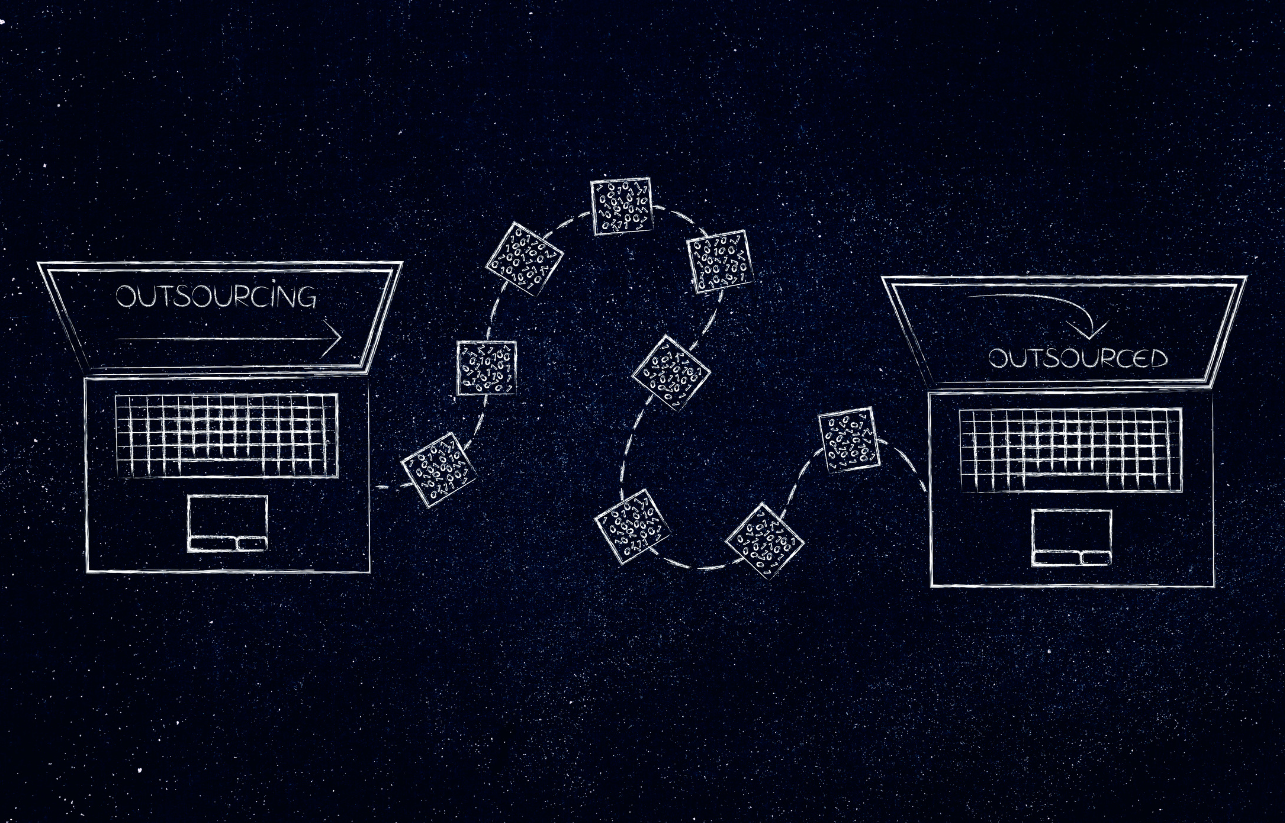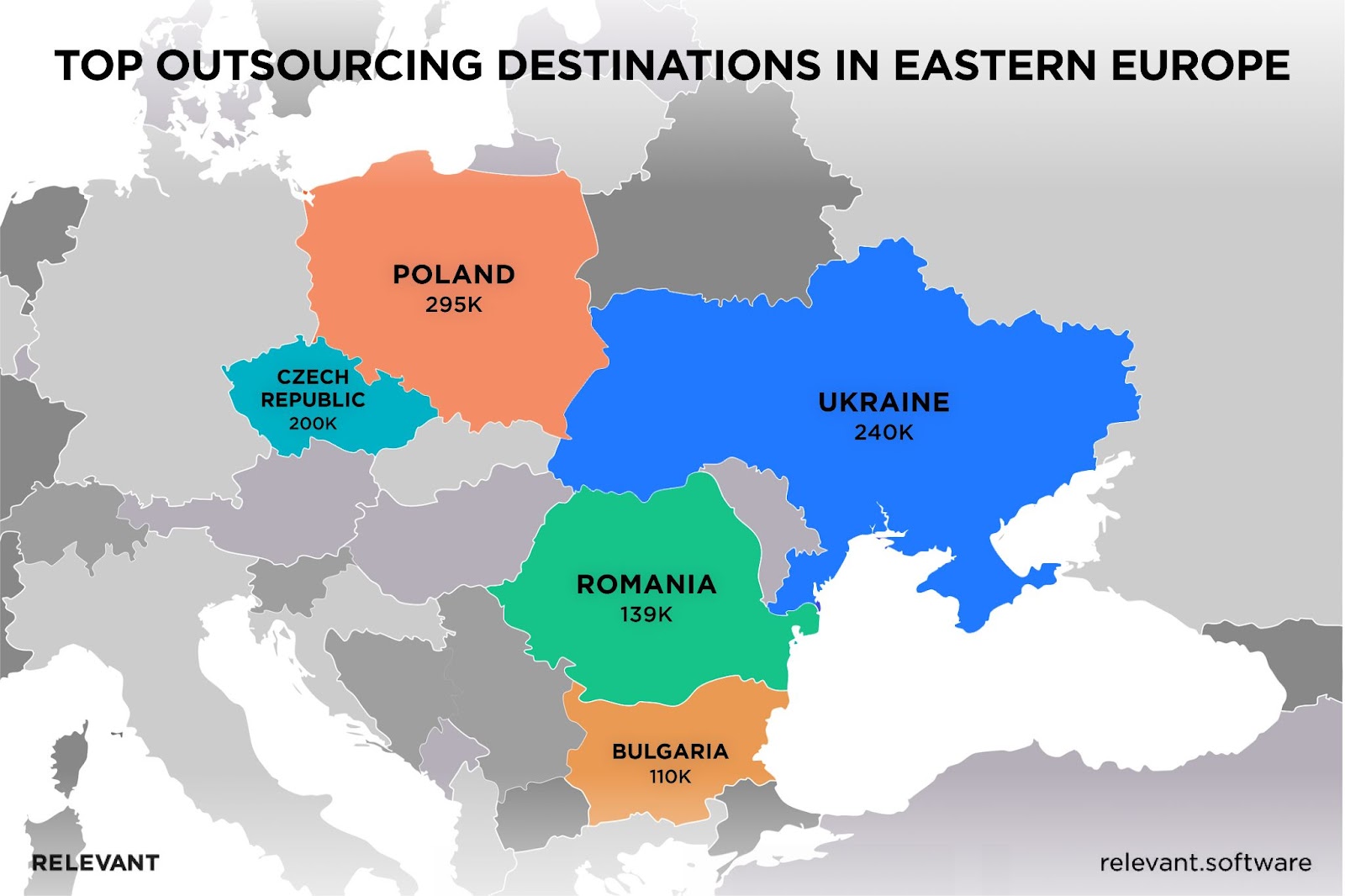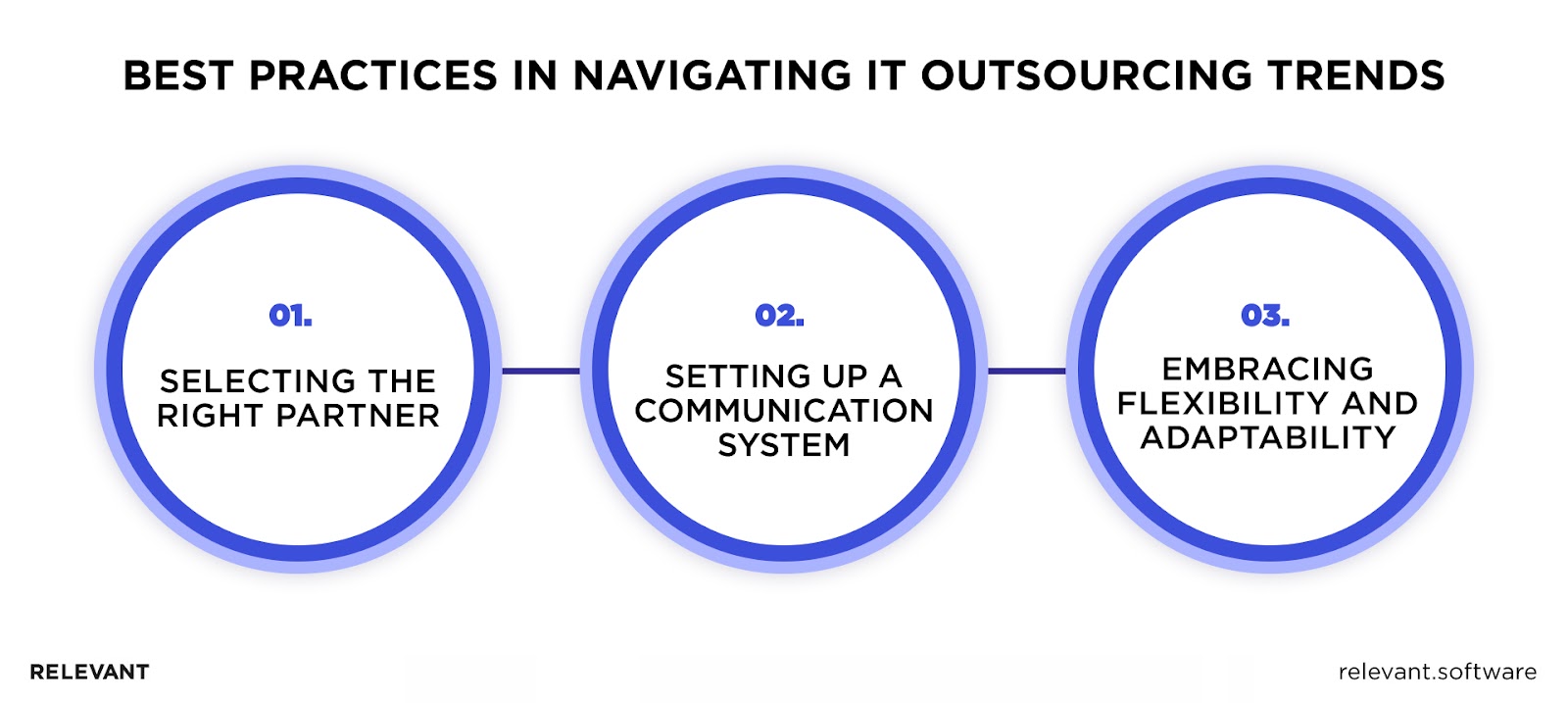IT Outsourcing Trends: What's Going On?

Statista points out that spending on IT outsourcing is set to hit $971.2 billion in 2023, a 22% increase from 2019. These figures indicate that IT outsourcing trends 2024 are becoming essential for more and more companies.
And you might already have an idea why. Outsourcing to other countries isn’t about scrimping pennies anymore. 60% of organizations choose IT outsourcing services for app development because of the agility and fresh thinking it brings, not to mention the chance to work with some of the best tech brains around the globe. Besides, outsourcing takes the pressure off internal teams, letting them zero in on crucial tasks. YouGov found that around 32% of British B2B companies outsource their IT support, the highest rate for any service.
from 25 countries outsourced software development to Relevant
We provide companies with senior tech talent and product development expertise to build world-class software.
This article shows the lowdown on fresh trends in outsourcing – what’s emerging and changing. We’re not just guessing here; this is based on thorough market research and what the Relevant experts say.
Current IT Outsourcing Trends
So, are you wondering what the future of IT outsourcing will look like as 2023 ends and 2024 approaches? Let’s dig into what has been at the hearing in 2023.

Automation and AI-driven Outsourcing
Automation, particularly through Artificial Intelligence (AI), is poised to shape the future of outsourcing significantly. Investments are pouring into areas like Robotic Process Automation (RPA) and AI, transforming various industries rapidly. A Gartner report reveals a striking consensus: 83% of professionals expect RPA to become more crucial in the next decade, while 80% anticipate a similar trajectory for AI.
This IT outsourcing trend indicates growing demand for specialists such as data scientists, big data analysts, and AI experts. The emergence of virtual agents and bots is designed to simplify routine tasks, change the labor market, and require new skills. Predictions for 2026 suggest AI-centric system expenses will reach 300 billion, enhancing efficiency across numerous sectors. These developments are not just about technology; they’re about positioning businesses for sustainable growth and technological leadership.
Increasing Emphasis on Cybersecurity
These days, cyber threats are a big deal, seriously impacting how we do business. Get this IT statistics: by 2025, cybercrime might cost us a jaw-dropping $10,5 trillion annually. That’s why when companies outsource their IT now, they’re not just looking for data protection – they want experts who can outsmart and prevent complex cyber attacks. This is a game-changer. It’s no longer just about playing defense; strong cybersecurity is a must-have for any business planning to stick around.
Eastern Europe: IT Outsourcing’s Hidden Gem
Let’s talk about outsourcing to Eastern Europe as we head towards 2024. It’s becoming the secret weapon for companies wanting top IT talent without the steep prices. Destinations like Ukraine or Poland aren’t just bringing tech skills to the table; they’re offering creativity and a solid tech education.
What’s truly remarkable about these Eastern European professionals is their ability to provide services that rival the industry’s best. It is not just helping to reduce labor, material, and other resource costs; less regulation boosts profit and gains a competitive advantage. Read more about why Ukraine has become the software development hub for companies from Western countries.

The Shift to Cloud-Based Solutions
This year, we’re witnessing a significant uptick in companies adopting cloud-based solutions. It’s not just about saving money. The real draw is the access to high-end technology without the hefty investment of developing it internally. Cloud services are offering a gateway to advanced tech but at a cost that’s far more acceptable to businesses.
Additionally, cloud technology is a game-changer in terms of flexibility and scalability. Traditional IT setups struggle to compete on this front. With reports showing that by 2025, over 95% of enterprise IT infrastructures will be cloud-based, it’s clear we’re not looking at a temporary trend. The cloud is shaping up to be the cornerstone of future IT strategies.

Emerging IT Outsourcing Trends 2024
Companies outsource for all sorts of reasons – maybe they need to be more flexible, or they want skills they don’t have in-house, or they’re trying to keep costs down. But the way they’re doing it is changing. Outsourcing isn’t just one thing anymore; the software development outsourcing trends in the market are evolving and covering more and more different areas.
Rise of Nearshoring
Speaking of trends, nearshore software development has really come into its own in the IT outsourcing industry. It’s like businesses have had an ‘aha’ moment, realizing that they don’t always need to cast their nets across oceans to find the right partners. More and more, they’re looking closer to home, across their own borders.
This approach brings several advantages, not the least of which is being in the same or similar time zones. This makes for easier communication and coordination, not to mention the convenience of having your outsourcing partner just a short trip away. But it’s more than just about convenience; it’s about building more synchronized, understanding partnerships in IT outsourcing.

As-a-Service Model Proliferation
The “Everything-as-a-Service” (XaaS) model is taking the IT world by storm. It’s like the Netflix of IT services. You get what you need – products, tools, or technologies – when you need it, without the hassle of owning and maintaining everything. This approach is a game-changer for businesses that want to stay nimble. Instead of sinking money into specific software or hardware, companies can now tap into a buffet of IT services on a subscription basis. This flexibility to scale services up or down as needed is perfect for today’s fast-paced business environment, making IT operations more responsive and cost-effective than ever before.
Emphasis on Sustainable and Ethical Outsourcing (Green IT)
There’s a growing wave of consciousness in software development outsourcing trends, and it’s all about being green and ethical. Imagine the tech world putting on a green hat. Companies these days are looking beyond just the bottom line; they’re seeking partners who share their commitment to the environment.
Imagine data centers that sip rather than gulp energy, strategies aimed at slashing carbon footprints, and smarter, more responsible ways of dealing with outdated tech equipment. It’s IT with a conscience, where doing good for the environment also means doing good for business. It’s no longer just about who can do the job but also about who can do it in a way that’s kinder to our planet. Green IT services in outsourcing trends isn’t just a nice-to-have anymore; it’s becoming a key deciding factor.
Your next read: IT Outsourcing
Impact of Global Events on IT Outsourcing
The world of IT outsourcing is anything but stable. Geopolitical events, encompassing political, economic, and social factors on a global level, wield significant influence over outsourcing trends.
The COVID-19 Pandemic and Remote Work
When COVID-19 hit, it didn’t just shake up our daily lives; it turned the IT outsourcing world upside down. Suddenly, everyone was talking about remote work. It wasn’t just a stopgap – it became the new norm. Businesses found out that their IT needs could be managed from pretty much anywhere, sparking a surge in outsourcing. They started reaching out across time zones, tapping into talent they wouldn’t have considered before. This shift wasn’t just about adapting to a pandemic; it changed the game for how we think about work and collaboration in IT.
Geopolitical Factors (Wars)
Wars and geopolitical tensions aren’t just headlines; they have real ripple effects in the IT outsourcing sector. When a region gets unstable, it sends shockwaves through the outsourcing strategies of companies connected there. Suddenly, there’s a scramble to think about data security, infrastructure reliability, and keeping the workforce stable.
It’s made businesses think harder about where they put their outsourcing eggs, pushing them to spread out their operations to dodge these geopolitical bullets. In today’s world, being smart about outsourcing means keeping an eye on the global political climate as much as the bottom line.
Best Practices in Navigating IT Outsourcing Trends 2024
When you’re diving into the IT outsourcing world, the make-or-break factor often comes down to who you choose to partner with. Here’s how you can make a smart choice.

Selecting the Right Partner
Hiring the right IT outsourcing vendor is like finding the right co-pilot for your business journey. It’s about more than just skills; it’s about finding someone who aligns with your vision and can be a part of your business’s growth story.
- Look for Relevant Experience: Big names are great, but what you really need is someone who gets your specific industry. For example, if you’re in the healthcare space, a partner who’s already navigated that healthcare world will be way more helpful than someone who’s just dipping their toes in.
- Communication That Clicks: Have you ever had a conversation where it just clicked? That’s what you need with your IT partner. It’s not about them bombarding you with tech jargon. It’s about clear, straightforward talk where both of you understand each other perfectly. This means fewer mix-ups and a smoother ride.
- Ready to Roll with the Punches: Business can be unpredictable. One day, you’re cruising; the next, you’re in high gear. You need a partner who can keep up with that pace, scaling their services up or down as your business ebbs and flows.
- Security’s Not a Side Note: We live in a world where data leaks are a serious business hazard. Make sure your partner takes security as seriously as you do, with solid measures to keep your info safe.
- Value over Price: Sure, we all love a good deal, but with IT outsourcing, the cheapest option can sometimes end up costing you more in the long run. Look for someone who offers the best bang for your buck – quality services at a reasonable price.
- Project Management That’s On Point: A partner who’s a whiz at project management keeps things ticking along smoothly. You want someone who’s got the chops to deliver your projects on time without blowing the budget.
- Ahead of the Tech Curve: In the tech world, yesterday’s news is, well, old news. Your partner should not just be up-to-date in IT outsourcing industry trends but also forward-thinking, constantly innovating and bringing fresh ideas to the table.
Setting Up a Communication System That Actually Works
Imagine you’re setting up a communication system for your IT outsourcing that’s as smooth as your favorite coffee shop’s ordering process. You’d want to pick tools that everyone’s comfortable with, right? Maybe your team loves quick Slack messages or finds Zoom calls more effective for those longer discussions. The key is finding what fits your team’s style.
Now, think about how you’d set the rules for a game night with friends. In the same way, decide when it’s best to shoot an email, make a call, or send a quick message. This keeps everyone on the same page and ensures no important details slip through the cracks.
And here’s something crucial – write everything down. It’s like keeping a diary of your project. This way, you have a clear record of all decisions and discussions. It helps avoid “I thought you said” nuances and keeps everyone accountable.
Embracing Flexibility and Adaptability
In the IT world, being flexible and adaptable is like survival– you must be ready to shift your actions according to the market demands. Regarding outsourcing, you need a team that’s ready to adapt on the fly. Think of your business needs like a rollercoaster – sometimes you’re scaling up, and other times you’re slowing down. A great outsourcing partner rides along with you, adjusting their services to your business’s ups and downs. This kind of partnership keeps your business agile and ready for whatever comes next in the ever-changing IT landscape.
Why Relevant Can Be Your Credible IT Outsourcing Partner
Choosing Relevant as your IT outsourcing partner means you’re getting more than just a service provider. Here’s why we stand out:
- We’re always clued into the latest software development outsourcing trends. Think of us as that tech-savvy mate with the inside scoop on application development.
- We understand that every business is its own world. That’s why we offer solutions that are specifically crafted for you, whether you’re just starting out or scaling new heights.
- Our team is stacked with global outsourcing experts, but we pride ourselves on delivering with the warmth and approachability of a trusted local partner.
- We’re all about delivering top-notch services at prices that won’t give your finance team nightmares. High quality, reasonable outsourcing costs – that’s what we stand for.
To sum it up, if you want to hire a straightforward, genuinely dedicated development team, contact us. We make the whole outsourcing experience effective, impactful, and even enjoyable!


Hand-selected developers to fit your needs at scale! Let’s build a first-class custom product together.

